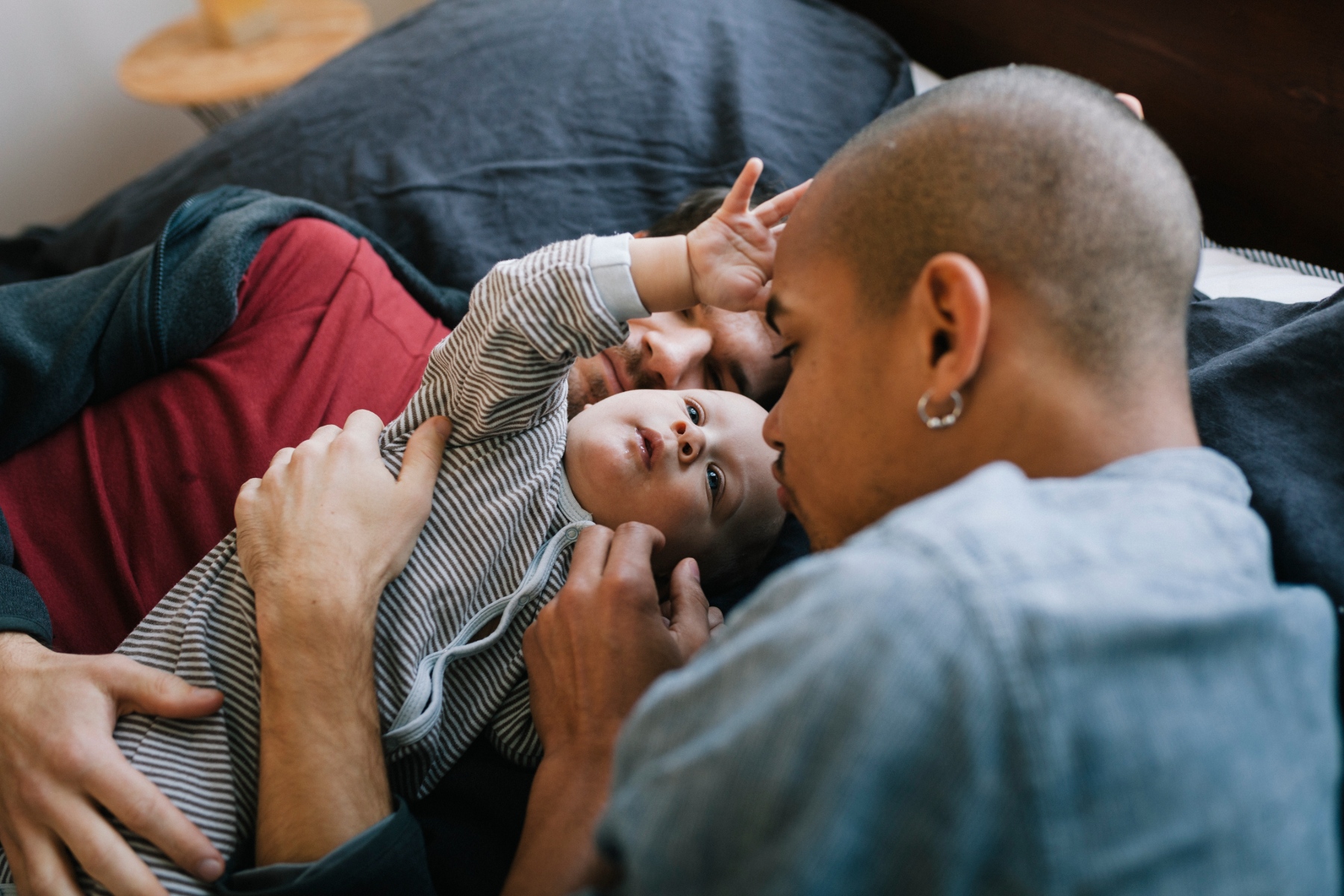Many LGBTQ+ parents don’t feel safe in the United States, according to a new survey.
A third of LGBTQ+ parents in the U.S. recently surveyed by the market research company Kantar, in partnership with DIVA Charitable Trust and The Curve Foundation, don’t feel like they have the same legal rights as other families. Although 63 percent of those parents are legally married, the many benefits of a legal union still don’t outweigh the hurdles that LGBTQ+ parents face when raising a family.
When asked if they have the same parental rights and legal recognition as cisgender, heterosexual couples, 33 percent of LGBTQ+ parents said no. Twelve percent said they are not open about their gender identity to anyone in their kids’ school community, while 8 percent said the same about their sexual orientation. And one in four LGBTQ+ parents said they have experienced obstacles to career progression due to their sexual orientation.
This analysis of LGBTQ+ women and nonbinary people comes from anonymous online surveys of more than 2,500 parents and families across India, South Africa, the United Kingdom and the United States in January and February 2025.
These findings provide a crucial snapshot of the experiences of LGBTQ+ parents in the United States at a time when they are living in fear of how their rights could be curtailed by a second Trump administration. Before President Trump was sworn-in, some LGBTQ+ parents rushed to adopt their children to retain parental rights to their nonbiological kids. Some parents of transgender youth with the means to do so left the country shortly after Trump won. And in just a few months, Trump has signed executive orders that send a strong signal about the administration’s narrow view of family as one that excludes LGBTQ+ couples, and its view that trans and nonbinary people don’t exist.
According to a 2024 report from the Williams Institute at UCLA, 2.57 million LGBTQ adults in the United States are parenting children. What are the laws that protect them? And what resources are available for LGBTQ+ parents? The 19th dug into available research to explain.
Where can LGBTQ+ families find support?
For families of trans youth looking for logistical and financial help as they navigate finding gender-affirming care for their children, the Campaign for Southern Equality has resources available. The advocacy group for LGBTQ+ people in the South is providing patient navigation services and emergency grants to families struggling to access gender-affirming care. As much of the country bans such care for trans youth, families in the South have relied on this project to fund travel across state lines in search of medical care.
Additionally, Keshet and the Hebrew Free Loan Society are offering interest-free loans of up to $10,000 to support relocation costs for individuals and families who are moving to another state because of anti-LGBTQ+ laws in their current state. Applicants do not have to be Jewish and can be moving from any state in the U.S. to another state — but not out of the country.
Online “know your rights” information hubs from nonprofits like Family Equality can be helpful for LGBTQ+ parents with questions about their legal rights for specific issues, like how their children can be treated in school — just ensure that those hubs have been updated recently. The National LGBTQ+ Bar Association and the National Center for Lesbian Rights also run a family law attorney directory for people seeking specialized legal help.
For parents looking for local community support, LGBTQ+ family advocacy group PFLAG National has chapters throughout the country. Although not catered to families, state-level LGBTQ+ organizations can also be found through the Equality Federation. And resources for those managing infertility stress and pregnancy after infertility can be found through Resolve: The National Infertility Association, which is LGBTQ-friendly.
-
Read Next:
Can I take leave from work to care for my partner? What if we are not married or in a legally recognized relationship?
LGBTQ+ couples who are legally married (or in a common law marriage) have the same right to take extended unpaid leave from work to care for their sick spouse or child, or to bond with their newborn child, as heterosexual couples do under the federal Family and Medical Leave Act. This applies whether or not your child is adopted or fostered. Eligibility requirements depend on details about someone’s employer, not their relationship.
However, LGBTQ+ couples who are not married need to check their state laws. In twelve states and Washington, D.C., workers can take leave to care for their partner, even if the couple is not in a legally recognized relationship — and in many of those states, that leave is actually paid.
Is fertility treatment care LGBTQ-inclusive and covered by private insurance in my state? What about Medicaid?
Yes — if you live in California, Colorado, Illinois, New York, Maine, New Jersey or Washington, D.C., according to the Movement Advancement Project. In nine other states, private insurers are required to cover fertility treatment care, but those laws are not explicitly inclusive of LGBTQ+ people. Three states that provide some form of private insurer coverage for fertility treatment — Hawaii, Texas and Arkansas — include policy language that may exclude LGBTQ+ couples.
Only a handful of states and Washington, D.C. require Medicaid to cover at least some fertility treatment care, although available treatment differs across those states and coverage is limited in several cases to cancer patients.
-
Read Next:
What are my rights when it comes to adoption and foster care?
In 2016, the last state ban against LGBTQ+ couples adopting children was ruled unconstitutional by a federal judge. Queer married couples can adopt in all 50 states through stepparent adoption. There are different kinds of adoption: stepparent adoption for someone who is married to a child’s legal parent, or a co-parent or second-parent adoption, which does not require the couple to be married. The latter is only available in 21 states and Washington, D.C. There is also confirmatory adoption, a more streamlined process, in nine states.
Couples who want to foster have a more difficult road ahead: fourteen states permit state-licensed child welfare agencies to refuse to place children in homes with LGBTQ+ parents, if doing so conflicts with that agency’s religious beliefs. Those states include Arizona, Texas, Virginia, Michigan, South Carolina and Utah. Several other states don’t have laws on the books that explicitly protect LGBTQ+ couples from discrimination in foster care based on their identity, which leaves the door open for them to be turned away.
Is my parent-child relationship legally recognized if we conceived with assisted reproduction, including the use of a donor?
Yes, although in most states — 32, to be exact — this recognition depends on marriage status. This means that if a woman has a child with her wife through donor insemination, both women are the legal parents, including the non-gestational, non-genetic mother.
According to the Movement Advancement Project, 18 states and Washington, D.C. recognize an intended parent as a legal parent, regardless of marital status, if both parties consent to the conception of a child born using assisted reproduction.
LGBTQ+ couples should take further action to ensure legal recognition of their parent-child relationship whether they are married or not, said Polly Crozier, director of family advocacy at GLAD Law, which has more resources for navigating parentage security. Couples can sign a voluntary acknowledgement of parentage or get a court order of parentage.
Which states protect my child from discrimination at school based on their LGBTQ+ identity?
Nineteen states, plus Washington D.C., prohibit discrimination in schools based on sexual orientation and gender identity, per the Movement Advancement Project, while 17 states have created specific guidance to support transgender and nonbinary students. These laws are meant to protect students from being unfairly denied access to facilities, sports teams, or clubs on the basis of their LGBTQ+ identity. However, New Hampshire and Virginia, which have these nondiscrimination laws in place, have also banned trans youth from playing in sports consistent with their gender identity.
Often, in states like Virginia that pass school sports bans, enforcement varies across the state and some school districts refuse to implement such bans.
Correction: This article has been updated to clarify that queer married couples can adopt in all 50 states.








